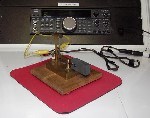At last......
18 posts
• Page 1 of 1
At last......
Iter finally being built
Maybe, finally it will be possible to know if Fusion Power is here for real......
Maybe, finally it will be possible to know if Fusion Power is here for real......
Sic Transit Gloria Mundi
-

Sigma_Orionis - Resident Oppressed Latino
- Posts: 4498
- Joined: Mon May 27, 2013 2:19 am
- Location: The "Glorious Socialist" Land of Chavez
Re: At last......
And in the meantime the NIF is showing that all that money thrown at it is doing something at least:
Nuclear fusion milestone passed at US lab
Nuclear fusion milestone passed at US lab
Sic Transit Gloria Mundi
-

Sigma_Orionis - Resident Oppressed Latino
- Posts: 4498
- Joined: Mon May 27, 2013 2:19 am
- Location: The "Glorious Socialist" Land of Chavez
Re: At last......
"Something" perhaps, but not much. They didn't manage to exceed the output of the lasers.
And seriously, how the bloody hell do they plan on scaling their process up?
If we're going to research fusion power, how about methods that are actually amenable to, you know, generating power?
And seriously, how the bloody hell do they plan on scaling their process up?
If we're going to research fusion power, how about methods that are actually amenable to, you know, generating power?
-

Cyborg Girl - Boy Genius
- Posts: 2138
- Joined: Mon May 27, 2013 2:54 am
Re: At last......
Considering how hard is to achieve Controlled Nuclear Fusion, I'd say it's more than "Not Much". And right now, these guys have gotten further than anyone else (with any of the several approaches to achieving it) in the world.
Sic Transit Gloria Mundi
-

Sigma_Orionis - Resident Oppressed Latino
- Posts: 4498
- Joined: Mon May 27, 2013 2:19 am
- Location: The "Glorious Socialist" Land of Chavez
Re: At last......
the amount of energy released through the fusion reaction exceeded the amount of energy being absorbed by the fuel - the first time this had been achieved at any fusion facility in the world.
This is significant. Once they actually reach a point where they can achieve containable sustainable release of energy then we work on how to turn that into energy production.

"To create more positive results in your life, replace 'if only' with 'next time'." — Author Unknown
"Experience is a hard teacher because she gives the test first, the lesson afterward." — Vernon Law
"Experience is a hard teacher because she gives the test first, the lesson afterward." — Vernon Law
-

SciFiFisher - Redneck Geek
- Posts: 4926
- Joined: Mon May 27, 2013 5:01 pm
- Location: Sacramento CA
Re: At last......
Only they're using an almighty laser focused on a very expensive special pellet through a very expensive special container. How many of these things can they ignite per day right now? They'd need to ignite several per second to generate power.
How are they going to scale it up? How are they going to extract heat from it, so they can power a turbine and actually generate electricity? How are they going to keep the lasers and all running properly during continuous operation?
What I'm saying is, even if this method works as far as fusion, it may not ever be amenable to energy production.
How are they going to scale it up? How are they going to extract heat from it, so they can power a turbine and actually generate electricity? How are they going to keep the lasers and all running properly during continuous operation?
What I'm saying is, even if this method works as far as fusion, it may not ever be amenable to energy production.
-

Cyborg Girl - Boy Genius
- Posts: 2138
- Joined: Mon May 27, 2013 2:54 am
Re: At last......
From here
Took almost 100 years and enormous efforts until a lighbulb went from a curiosity to a practical device. FIRST they have to show that the damned thing works. IF you ask me, I like ITER's magnetic confinement approach a lot more. I don't know how they're going to scale it up, but it's not THEIR job, their job is to see if it's possible. Scaling it up and turning it into a power plant (assuming their approach works) is the jobs of Engineers, BUT until these guys don't get it working. Engineers can't begin to work on how (and IF) it's possible to optimize it and turn it into a practical device.
In 1802, Humphry Davy had what was then the most powerful electrical battery in the world at the Royal Institution of Great Britain. In that year, he created the first incandescent light by passing the current through a thin strip of platinum, chosen because the metal had an extremely high melting point. It was not bright enough nor did it last long enough to be practical, but it was the precedent behind the efforts of scores of experimenters over the next 75 years. In 1809, Davy also created the first arc lamp with two carbon charcoal rods connected to a 2000-cell battery; it was demonstrated to the Royal Institution in 1810.
Took almost 100 years and enormous efforts until a lighbulb went from a curiosity to a practical device. FIRST they have to show that the damned thing works. IF you ask me, I like ITER's magnetic confinement approach a lot more. I don't know how they're going to scale it up, but it's not THEIR job, their job is to see if it's possible. Scaling it up and turning it into a power plant (assuming their approach works) is the jobs of Engineers, BUT until these guys don't get it working. Engineers can't begin to work on how (and IF) it's possible to optimize it and turn it into a practical device.
Sic Transit Gloria Mundi
-

Sigma_Orionis - Resident Oppressed Latino
- Posts: 4498
- Joined: Mon May 27, 2013 2:19 am
- Location: The "Glorious Socialist" Land of Chavez
Re: At last......
Point taken.
I'd definitely like to believe that they're on the road to something that works, seeing as power sources will be one of the major hurdles in the coming century or so. But I'm rather skeptical of this method of inertial confinement. OTOH I'm not a physicist (or an engineer).
I'd definitely like to believe that they're on the road to something that works, seeing as power sources will be one of the major hurdles in the coming century or so. But I'm rather skeptical of this method of inertial confinement. OTOH I'm not a physicist (or an engineer).
-

Cyborg Girl - Boy Genius
- Posts: 2138
- Joined: Mon May 27, 2013 2:54 am
Re: At last......
Dr. Brown, Dr. Emmett Brown, you have a call on the mauve FWIS inquisitor's telephone...
Dear Algebra -- stop asking us to find your x. She's not coming back - ever. Get over it.
-

cid - Database Ninja Level 1
- Posts: 829
- Joined: Fri May 31, 2013 7:37 pm
Re: At last......
You have reached the Emmett L. Brown, 24-hour Scientific Services Toll-Free line
All our operators are currently attending other customers, your call is very valuable to us.
Dr. Brown has left a message about your specific inquiry
All our operators are currently attending other customers, your call is very valuable to us.
Dr. Brown has left a message about your specific inquiry
If my calculations are correct, when this baby hits 88 miles per hour... you're gonna see some serious sh*t ...
Sic Transit Gloria Mundi
-

Sigma_Orionis - Resident Oppressed Latino
- Posts: 4498
- Joined: Mon May 27, 2013 2:19 am
- Location: The "Glorious Socialist" Land of Chavez
Re: At last......
This might help getting results a bit faster.
At such extreme temperatures they can survive inside nuclear fusion reactors and on the nozzles of rockets.
"We want to build the best quality metal products ever made. Objects you can't possibly manufacture any other way," said David Jarvis, Esa's head of new materials and energy research.
"To build a [fusion reactor], like Iter, you somehow have to take the heat of the Sun and put it in a metal box.
"3,000C is as hot as you can imagine for engineering.
"If we can get 3D metal printing to work, we are well on the way to commercial nuclear fusion."
Sic Transit Gloria Mundi
-

Sigma_Orionis - Resident Oppressed Latino
- Posts: 4498
- Joined: Mon May 27, 2013 2:19 am
- Location: The "Glorious Socialist" Land of Chavez
Re: At last......
Now This I find hard to believe.
Why?
I don't have nowhere near the expertise or the experience to question it, however, for the last 60 years everyone in Nuclear Fusion has tried to achieve ignition. Lockheed mentions in passing that next year they'll achieve it and furthermore create a compact workable fusion reactor in 10 years.
One one hand, it's Lockheed's Skunkworks Division, so at least they ought to know what they're talking about. ON the other, the claim is.... let's just say extraordinary. So, I'll believe it if they DO manage to reach ignition in a year. Until then, nope.
At the very least, people who do this kind of stuff for a living, are skeptical.
Why?
I don't have nowhere near the expertise or the experience to question it, however, for the last 60 years everyone in Nuclear Fusion has tried to achieve ignition. Lockheed mentions in passing that next year they'll achieve it and furthermore create a compact workable fusion reactor in 10 years.
One one hand, it's Lockheed's Skunkworks Division, so at least they ought to know what they're talking about. ON the other, the claim is.... let's just say extraordinary. So, I'll believe it if they DO manage to reach ignition in a year. Until then, nope.
At the very least, people who do this kind of stuff for a living, are skeptical.
Sic Transit Gloria Mundi
-

Sigma_Orionis - Resident Oppressed Latino
- Posts: 4498
- Joined: Mon May 27, 2013 2:19 am
- Location: The "Glorious Socialist" Land of Chavez
Re: At last......
Sigma_Orionis wrote:Now This I find hard to believe.
Why?
I don't have nowhere near the expertise or the experience to question it, however, for the last 60 years everyone in Nuclear Fusion has tried to achieve ignition. Lockheed mentions in passing that next year they'll achieve it and furthermore create a compact workable fusion reactor in 10 years.
One one hand, it's Lockheed's Skunkworks Division, so at least they ought to know what they're talking about. ON the other, the claim is.... let's just say extraordinary. So, I'll believe it if they DO manage to reach ignition in a year. Until then, nope.
At the very least, people who do this kind of stuff for a living, are skeptical.
was this a grant proposal?
"To create more positive results in your life, replace 'if only' with 'next time'." — Author Unknown
"Experience is a hard teacher because she gives the test first, the lesson afterward." — Vernon Law
"Experience is a hard teacher because she gives the test first, the lesson afterward." — Vernon Law
-

SciFiFisher - Redneck Geek
- Posts: 4926
- Joined: Mon May 27, 2013 5:01 pm
- Location: Sacramento CA
-

Sigma_Orionis - Resident Oppressed Latino
- Posts: 4498
- Joined: Mon May 27, 2013 2:19 am
- Location: The "Glorious Socialist" Land of Chavez
-

Sigma_Orionis - Resident Oppressed Latino
- Posts: 4498
- Joined: Mon May 27, 2013 2:19 am
- Location: The "Glorious Socialist" Land of Chavez
Re: At last......

If this pans out I would say within 10 years we might be buying electricity produced by fusion reactors.
"To create more positive results in your life, replace 'if only' with 'next time'." — Author Unknown
"Experience is a hard teacher because she gives the test first, the lesson afterward." — Vernon Law
"Experience is a hard teacher because she gives the test first, the lesson afterward." — Vernon Law
-

SciFiFisher - Redneck Geek
- Posts: 4926
- Joined: Mon May 27, 2013 5:01 pm
- Location: Sacramento CA
Re: At last......
Maybe they should go and pitch the idea to Elon Musk, I've read that they need 4 to 5 billion US$
Sic Transit Gloria Mundi
-

Sigma_Orionis - Resident Oppressed Latino
- Posts: 4498
- Joined: Mon May 27, 2013 2:19 am
- Location: The "Glorious Socialist" Land of Chavez
-

Sigma_Orionis - Resident Oppressed Latino
- Posts: 4498
- Joined: Mon May 27, 2013 2:19 am
- Location: The "Glorious Socialist" Land of Chavez
18 posts
• Page 1 of 1
Who is online
Users browsing this forum: No registered users and 1 guest
